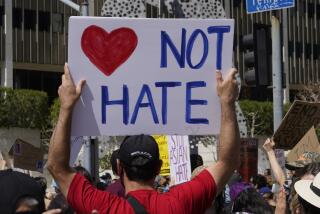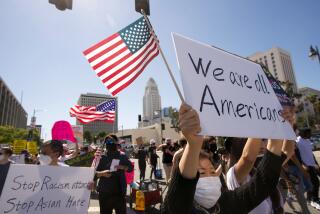Reading Between Hate Crime Lines
- Share via
* I read with great interest and increasing concern the article “Little Change Seen in Hate Crimes Against Asians,” Sept. 9.
The article states that of 183 hate crimes reported locally last year, 125 were against ethnic minorities, i.e., African Americans, Jews, Latinos and Asians, in order of decreasing frequency.
By exclusion, the remaining 58 hate crimes apparently were against Caucasian Americans since they are the only other numerically significant ethnic group in this area. This would seem to indicate that Caucasian Americans are the victims of more hate crimes than any other racial group. This is never mentioned.
In addition, the data is never analyzed to determine how many of the 125 hate crimes suffered by ethnic minorities were committed by African Americans against Latinos or Jews against Asians, and so forth. Instead, the article implies that the entire responsibility for the problem belongs to that segment of the population that is white.
WARD WISEMAN
Anaheim
* Hate crimes have far reaching effects; let’s not blame the victims.
The Sept. 13 story “Lesbians Respond to Hate Crime Survey” highlights the need for stronger support against hate crimes based on sexual orientation.
Many academic studies and government-funded reports over the last 20 years indicate that gay men and lesbians are disproportionately victims of hate-motivated violence.
Furthermore, there is evidence that hate crimes based on sexual orientation have more profound psychological effects than other crimes.
While the reasons cited in the article for “not reporting” by Orange County lesbians are important, another factor should be considered--the tendency of society to “blame the victim.”
After crimes like this, people often ask, “What was the person doing or wearing?” “Were they holding hands in public?” “Were they dressed in a way that could identify themselves as gay or lesbian?”
These responses may deter victims from reporting hate crimes for fear of being “blamed” by society and the establishment for being victimized. This paradigm also places the responsibility of safety solely on the individual.
The society we live in sets the tone for whether we feel comfortable or not comfortable to express who we truly are; if we live in constant fear of victimization, we begin to lose trust in that society and become more reluctant to confide in it.
We need to work together to create environments that are safe and accepting of all people and do not condone discrimination and violence on any basis.
ALBERT LIU
Berkeley
More to Read
Sign up for Essential California
The most important California stories and recommendations in your inbox every morning.
You may occasionally receive promotional content from the Los Angeles Times.










